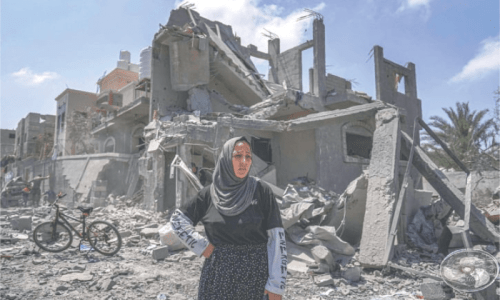PALESTINIAN TERRITORIUM: According to Gaza’s crossing authority, Israel freed over 150 prisoners who had been removed from the territory on Monday, citing mistreatment during their incarceration.
Fearing a further escalation of the conflict, Israel fired more airstrikes overnight and persisted in its attack on Gaza, stoking tensions in the region.
After Iran fired more than 300 drones and missiles at Israel on Saturday, major international countries urged moderation.
According to the Gaza crossings authority and an AFP journalist, the most recent detainees to be released were carried to Israel and returned via the Kerem Shalom border crossing. Before some of them received medical attention in a hospital in Rafah, which is located south of the besieged region, they were treated.
Authorities in Gaza allege maltreatment of inmates; US claims all parties are working on a new peace agreement.
Hisham Adwan, a spokesman for the Gaza Crossings Authority, told AFP that “it is very noticeable that there is severe mistreatment of these prisoners, as a number of them were sent to Abu Yousef al-Najjar Hospital for treatment.”
The Israeli military stated that mistreating people in custody was “absolutely prohibited,” but it did not comment on the release of these inmates.
The military issued a statement to AFP saying, “Those who are not involved in terrorist activity are released back to the Gaza Strip.”
Overnight attacks
Israeli planes carried out “dozens” of raids on central Gaza during the night, according to the Hamas government press office.
Israel has declared that it will not let the fight get sidetracked as concerns about a larger conflict were heightened by Iran’s unprecedented onslaught.
Rear Admiral Daniel Hagari, a spokesman for the Israeli military, stated late on Sunday that freeing captives was “our critical mission.”
Of the approximately 130 individuals, including 34 presumed dead, that Israel claims are still in the Palestinian group’s custody following the attack on October 7, Hagari stated that Hamas is still detaining them.
Approximately one week after removing the majority of its ground forces from the region, the Israeli army said that it was “calling up approximately two reserve brigades for operational activities on the Gazan front.”
Deal on truce “on the table”
Hamas announced late on Saturday that it had responded to a cease-fire proposal made by US, Qatari, and Egyptian negotiators during negotiations that began in Cairo on April 7.
The group declared that it will not budge from its earlier demands, which included “a permanent ceasefire” and the Israeli army’s evacuation.
Declaring that Hamas was “continuing to exploit the tension with Iran” and seeking for “a general escalation in the region,” Israel’s Mossad espionage service saw this as a rejection of the agreement.
The US claimed that mediation efforts are still ongoing, nevertheless.
“Diplomacy is not dead there,” Kirby of the National Security Council declared.
There is a fresh agreement available. That would result in the release of some prisoners, an end to hostilities, and increased humanitarian aid to Gaza, according to Kirby, is a fair deal.
Following rumors that an Israeli checkpoint on the coastal road had reopened, thousands of displaced Palestinians, desperate to get back to their homes, headed towards it on Sunday.
Rumors have been refuted by Israel.
Mahmoud Awdeh, a Palestinian, said, “She told me over the phone that people are leaving… she’s waiting at the checkpoint until the army agrees to let her head to the north.” He was hoping to see his wife, who has been in the southern city of Khan Yunis.
Fears of reprisals
Following Hamas’s strike on October 7, tensions between Israel and Iran’s regional supporters have escalated.
Following the Iranian attack, the UN Security Council met in emergency session on Sunday. Secretary-General Antonio Guterres issued a warning that war was “on the brink” in the area and Israel advocated for more penalties against Tehran.
The UN head declared, “Neither the region nor the world can afford more war.”
Iran’s UN envoy, Amir Saeid Iravani, stated that the country was responding to the widely-attributed Israeli attack on its consulate building in Damascus on April 1 by using its “inherent right to self-defence.”








